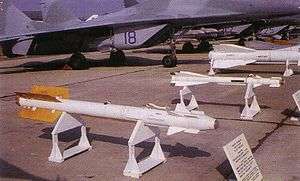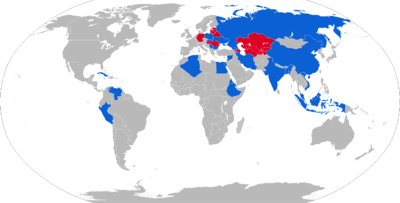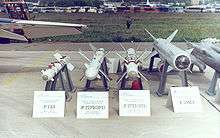R-73 (missile)
The Vympel R-73 (NATO reporting name AA-11 Archer) is a short-range air-to-air missile developed by Vympel NPO that entered service in 1984.[4]
| R-73 AA-11 Archer | |
|---|---|
 | |
| Type | Short-range air-to-air missile |
| Place of origin | Soviet Union |
| Service history | |
| In service | 1984–present |
| Production history | |
| Manufacturer | Vympel NPO (current),[1] Tbilisi Aircraft Manufacturing (current) |
| Specifications | |
| Mass | 105 kilograms (231 lb) |
| Length | 2.93 metres (9 ft 7 in) |
| Diameter | 165 millimetres (6.5 in) |
| Warhead | 7.4 kilograms (16 lb) |
| Engine | Solid-fuel rocket engine |
| Wingspan | 510 millimetres (20 in) |
Operational range | R-73E: 30 kilometres (19 mi) R-73M1: 30 kilometres (19 mi) [2] R-74: 40 kilometres (25 mi)[3] |
| Maximum speed | Mach 2.5 |
Guidance system | All-aspect infrared homing |
Launch platform |
|
Development
The R-73 was developed to replace the earlier R-60 (AA-8 'Aphid') weapon for short-range use by Soviet fighter aircraft. Work began in 1973, and the first missiles entered service in 1984.[4]
The R-73 is an infrared homing (heat-seeking) missile with a sensitive, cryogenic cooled seeker with a substantial "off-boresight" capability: the seeker can "see" targets up to 40° off the missile's centerline.[5] It can be targeted by a helmet-mounted sight (HMS) allowing pilots to designate targets by looking at them. Minimum engagement range is about 300 meters, with maximum aerodynamic range of nearly 30 km (19 mi) at altitude. The weapon is used by the MiG-29, MiG-31, Su-27/33, Su-34 and Su-35, and can be carried by newer versions of the MiG-21, MiG-23, Sukhoi Su-24, and Su-25 aircraft.[6] India is looking to use the missile on their HAL Tejas. It can also be carried by Russian attack helicopters, including the Mil Mi-24, Mil Mi-28, and Kamov Ka-50/52.
From 1994, the R-73 has been upgraded in production to the R-73M standard, which entered CIS service in 1997. The R-73M has greater range and a wider seeker angle (to 60° off-boresight), as well as improved IRCCM (Infrared Counter-Counter-Measures). Further developments include the R-74 (izdeliye 740) and its export variant RVV-MD.[7] Russia currently receives new improved air-to-air missiles on the basis of the R-73.[8]
An improved version of the R-74, the K-74M (izdeliye 750) features fully digital and re-programmable systems, and is intended for use on the MiG-35, MiG-29K/M/M2, Su-27SM, Su-30MK and Su-35S. A further upgrade, known as the K-74M2 (izdeliye 760), is intended for the fifth-generation Sukhoi Su-57 aircraft. This missile has reduced cross section to fit in internal weapon bays and will match the performance of the AIM-9X and the ASRAAM. A clean sheet design, the K-MD (izdeliye 300), will supersede the K-74M2 in the future.[9][10]
Operational history
On 24 February 1996, two Cessna 337s of the Brothers to the Rescue were shot down while flying over international waters 10 nautical miles outside of Cuban airspace by a Cuban Air Force MiG-29UB.[11] Each of the aircraft was downed by an R-73 missile.[12]
During the Eritrean-Ethiopian War from May 1998 to June 2000, R-73 missiles were used in combat by both Ethiopian Su-27s and Eritrean MiG-29s. It was the IR-homing R-60 and the R-73 that were used in all but two of the kills.
On 18 March 2008, a MiG-29 Fulcrum of the Russian Air Force intercepted a Georgian Elbit Hermes 450 UAV over Abkhazia. The MiG-29 destroyed the UAV with an R-73. missile.[13]
The Government of India claims that on February 27th, 2019 a MiG-21 Bison of Indian Air Force shot down a Pakistani F-16 with an R-73E missile during the 2019 Jammu and Kashmir airstrikes.[14] Pakistan denies loss of any F-16 aircraft in the incident.[15] Local people on the ground have also rejected Indian claims of shooting down a PAF F-16.[16][17] On 5 April 2019, PAF officials released images of all four missile recovered from the downed Mig-21 to prove that IAF Mig-21 did not fire any missile.[18] The image of the four missiles showed debris from two R-77 Adder and two R-73 Archer missiles recovered from the downed MiG-21. Two missiles, one R-73 and one R-77, were slightly more damaged than the other two.[18] Aviation experts say that the two missiles that were more damaged, are likely to have hit the ground when the MiG-21 crashed. Similarly, experts note that since the rocket motor’s tube is only broken into pieces and not destroyed, it’s unlikely that the missiles were launched.[18] A senior IAF pilots stated that 'the R-73 missile has a proximity fuse, that detonates the entire missile when it close in on its target. No part of the missile is left intact'.[18] On 8 April 2019, the IAF released two radar images of aerial engagement to reassert its claims of downing an F-16.[19][20][21] However, Pakistani officials rejected the radar images released by India.[22]
Variants
- R-73 - Standard model with ±40° off-boresight.
- R-73E - Export version of the standard model.[23]
- R-73M - Improved model.
- R-74 (izdeliye 740) - Improved model with ±60° off-boresight.
- RVV-MD - Export model of the R-74.[24]
- K-74M (izdeliye 750) - Improved model with ±75° off-boresight.
- K-74M2 (izdeliye 760) - Further improved variant with reduced cross-section for the Sukhoi Su-57. It serves as the Russian equivalent to the AIM-9X and ASRAAM.
Operators

Current operators
Former operators




.svg.png)

Gallery
 R-73 in front of an R-77
R-73 in front of an R-77
 Tejas PV-1 firing an R-73 missile during weapons trials in Goa
Tejas PV-1 firing an R-73 missile during weapons trials in Goa
References
- "Tactical Missiles Corporation JSC". Retrieved 10 September 2016.
- "AA-11 ARCHER R-73". Retrieved 23 December 2014.
- "Tactical Missiles Corporation JSC". Retrieved 23 December 2014.
- "Striving for a Safer World Since 1945".
- Reed Business Information Limited. "Vympel reveals previously classified air-to-air missiles". Retrieved 23 December 2014.
- http://www.uuaz.ru/production/su25ub/su25ub_wpn_e.html
- Barrie, Douglas and Pyadushkin, Maxim. "R-77, R-73 Missile Upgrades Emerge". Aviation Week. 13 August 2009
- Sputnik. "Russian Military Receiving New Improved Combat Air-to-Air Missiles". Retrieved 10 September 2016.
- Butowski, Piotr. Russia and CIS Observer. 17 June 2007.
- "Vympel plans to develop air-to-air missiles for Russia's PAK FA fighter". Jane's Missiles and Rockets. 19 May 2006
- University of Minnesota Human Rights Library (1999). "Armando Alejandre Jr., Carlos Costa, Mario de la Pena y Pablo Morales v. Republica de Cuba, Case 11.589, Report No. 86/99, OEA/Ser.L/V/II.106 Doc. 3 rev. at 586 (1999)". Retrieved 1 April 2019.
- "Cuba11.589". Retrieved 10 September 2016.
- "Russian jet shoots Georgian drone © Reuters". YouTube. Retrieved 23 December 2014.
- "R-73 missile: The weapon with which Wing Commander Abhinandan Varthaman brought down Pakistan's F-16 jet". Zee News India. Essel Group. Retrieved 8 May 2020.
- Lalwani, Sameer (17 April 2019). "Did India shoot down a Pakistani F-16 in February? This just became a big deal". Washington Post. Retrieved 27 June 2020.
- "What Happens After India and Pakistan Clash Over Kashmir?". National Interest. 28 October 2019.
New Delhi’s official claims of shooting down an F-16 of the Pakistan Air Force (PAF) were denied by all neutral observers.
- "No proof India shot down Pakistan F-16". Asia Times. 5 March 2019.
Meanwhile, locals on the ground reiterated that no Pakistani pilot bailed out along with Wing Commander Varthaman.
- SAIKAT DATTA And KUNWAR KHULDUNE SHAHID (6 April 2019). "US officials shoot down Indian claims of F-16 kill". Asia Times. Archived from the original on 14 May 2020.
- "Indian Radar Data That Supposedly Proves They Downed An F-16 Is Far From "Irrefutable"". The War Zone. 8 April 2019.
- "Radar images prove Pakistan F-16 shot down, says Indian Air Force". 9 April 2019 – via Japan Times Online.
- "IAF Says Has 'Irrefutable' Proof To Show Pakistan F-16 Was Shot Down", Huffington Post, 8 April 2019
- "Repetitions don't turn lies into truth: DG ISPR on IAF presser". Express Tribune. 8 April 2019.
- "R-73E". Rosoboronexport.
- "RVV-MD". Rosoboronexport.
- "Weapon". Retrieved 23 December 2014.
- The Military Balance 2016, p. 237.
- "Su-25KM SCORPION (It is made in Georgia)". YouTube. Retrieved 23 December 2014.
- "SIPRI Trade Register". Stockholm International Peace Research Institute.
- "Trade Registers". armstrade.sipri.org.
Further reading
- Gordon, Yefim (2004). Soviet/Russian Aircraft Weapons Since World War Two. Hinckley, England: Midland Publishing. ISBN 1-85780-188-1.
- Yak-130 04. August 2013.